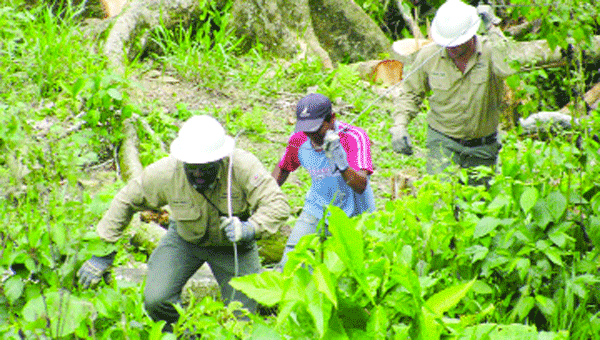‘A simple light bulb to shine’
Published 12:46 am Friday, August 9, 2013

Kevin Anderson and Josh Wilburn were among the CEC employees who worked in dense terrain in Guatemala.
CEC workers help villagers get electricity
It began with an agreement witnessed by President John F. Kennedy in 1962 between two organizations promising to use the cooperative business model to bring electricity to poor developing countries. That agreement between the National Rural Electric Cooperative Association (NRECA) and the U.S. Agency for International Development (USAID) led to the creation of the NRECA International Program which helps provide rural communities around the world with access to affordable electricity.
Last month, four Covington Electric Cooperative employees did their part to hold up that agreement.
As a member of NRECA, CEC has supported the International Program in the past by donating equipment and other supplies; however, on July 13, CEC line workers Josh Till, Kevin Anderson, Ross Parker, both of Andalusia, and Josh Winburn of Enterprise began a journey to Puerto Barrios, Guatemala, to lend their skills and time to this humanitarian effort. They joined other volunteers from Central Alabama Electric Cooperative in Prattville and the Alabama Rural Electric Association in Montgomery.
The Alabama crews worked with city utility employees on a line extension project involving a seven-mile single phase power line that brought central station electricity to the villages of Mirador and Tamarindal for the very first time. Most of the poles for the project had already been set by the city utility beforehand, but all of the wire still had to be pulled, the poles needed framing, guy anchors and guy wires had to be installed, and most of the right of way still had to be cleared. The CEC crew worked 10 hours a day, six days a week during the project.
The tropical mountainous terrain made for some very challenging working conditions.
“It was really difficult to continually walk up and down the steep hills pulling wire and climbing poles each day, but the locals are obviously used to it,” Parker said. “They found our struggles a little humorous at times.”
In addition to a rugged landscape, the procedures for building power lines in Guatemala are very different from standard procedures in America. According to Till, one example was the way they set anchors which was time-consuming and inefficient. The other primary differences included a lack of resources like hydraulic equipment, trucks and proper training.
“The entire city utility department of Puerto Barrios only has one bucket truck and one digger truck which were donated by American cooperatives,” he said. “They climb poles with a rope and no hooks or safety gear and it’s just normal for them. We showed them ways to improve their procedures, but we also adapted to their ways in some cases.”
CEC Vice President of Operations Alan Thrash, along with staff members from CAEC and NRECA, spent the second week of this project with the Alabama co-op line workers in Guatemala and they also met with local leaders to discuss the progress of this effort and future projects.
“The main reason they want electricity is for lights,” said Thrash. “They told me they want their children to be able to study at night without having to use candles. It really is like stepping back in time. They know what electricity can mean to a community and they have been asking for it for 38 years.”
According to all of the CEC volunteers, the villagers were friendly and very appreciative to be receiving such assistance from America. “They had a celebration for us when we completed our portion of the project,” Winburn said. “Seeing how they live really pulled at your heart strings and it gave me a new appreciation for everything we have here and take for granted.”
“These people have nothing compared to our standards of living, but they always seemed happy,” he said. “You would see a whole family riding on a motorcycle because that is their primary mode of transportation. They have no ovens, refrigerators, washing machines or air conditioning, but they were overjoyed to have a simple light bulb shine in their home.”
Till added, “The people are very proud, they have a great work ethic and it definitely leaves a positive impression with you.”
Anderson said the experience was life changing.
“You need to be open-minded and don’t carry any pre-conceived notions about the people there,” he said. “They are very hard working, most of them are farmers, and they want the best for their families just like everybody else.”





